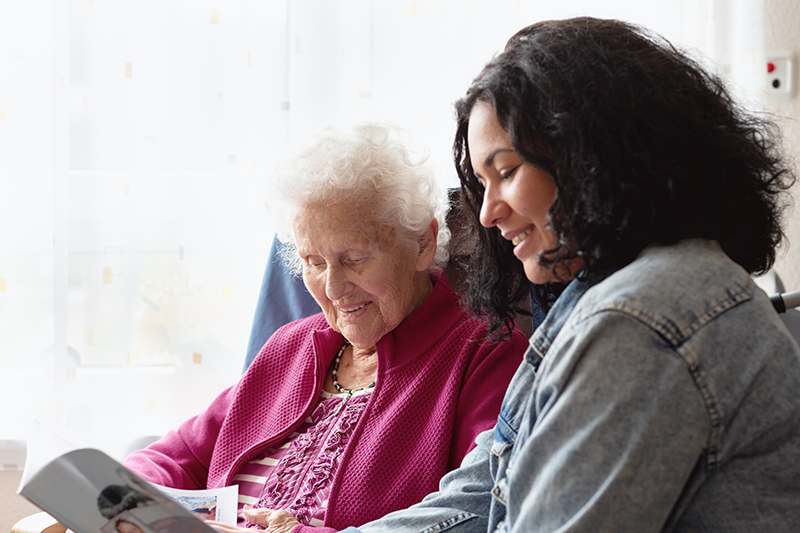Beginner’s Guide to Receiving Home Care
Information Availability
Emergency Information: Although At Home Independent Living will gather this information during the new client onboarding process, it is recommended that emergency contact information also be posted where the caregiver can easily find it, such as the refrigerator. Many clients choose to post information such as:

Use our handy beginner’s guide to home care for a better understanding of what to expect with senior care services.
- Emergency contacts
- Doctors’ names and contact information
- Allergies to medications
- Health conditions
- Community service providers, which may be your pharmacy, home health care provider, caremanager, durable medical equipment provider and At Home Independent Living
DNR Order: If you have a DNR, or Do Not Resuscitate order, it is important to post this document in a place that is clearly visible to both the caregiver and emergency medical technicians (EMTs).
Things to Consider
Outdoor Lockbox: Please consider how your caregiver, police or EMTs may access your home if you are not answering the door. If your caregiver is not able to access the home at the scheduled time, At Home Independent Living may call 911 to request a wellness check to ensure your safety. An outdoor lockbox is recommended to avoid damage to the door if a wellness check is needed and the door is not answered.
Secure Valuables and Controlled Substances: It is a best practice to store valuable items safely. It is also recommended that controlled substances, including prescription pain medications, be stored in a locked container.
Your Plan of Care
A personalized plan of care will be developed to ensure the caregiver’s tasks meet your wellness goals. Our team understands that individual needs change, and your plan of care must adapt. For this reason, it is essential to have open communication with At Home Independent Living when any change to the plan of care may be required.
There are several circumstances that may prompt the need to modify your plan of care, such as:
- Change in the level of assistance needed for tasks
- Change in the use of devices, such as a walker or wheelchair
- Change in condition or dietary restrictions
- Adding or changing the details of medication reminders
Limitations of Your Caregivers
The caregivers at At Home Independent Living are capable of providing a wide array of services to foster your independence and ensure safety at home. As a companion and homemaking agency, there are some tasks that our caregivers are not allowed to perform. Please understand that our caregivers are unable to perform the following tasks:
- Trimming fingernails and toenails
- Heavy duty household cleaning
- Yard work
- Home and computer repairs
- Managing finances
- Climbing stepstools/ladders with more than two steps
- Working in the home without the client present
- Managing medications, including placing pills into pill reminder boxes
- Administering medications (however, we can provide reminders and assistance)
Please note that your caregiver can help with running errands, including shopping and going to the pharmacy. Although your caregiver can use your credit card or cash on your behalf for these errands, please do not share your debit card PIN with anyone, including your caregiver. Debit cards can be used as credit cards, making it unnecessary to share your PIN.
Please refrain from sharing personal funds with your caregivers. All caregivers are employees, and their total compensation package is managed by At Home Independent Living. Loans, payment for services or cash bonuses should not be given directly to your caregiver.
Preparing Your Home for Caregivers
- Designate the best person to contact in an emergency.
- Plan for unexpected service interruptions such as caregiver illness or inclement weather.
- Ensure that the address and corresponding cross-streets are noted with your caregiver in case of 911 calls.
- Consider installing video or smart home technology for additional safety, as well as other home modifications such as grab bars and raised toilets.
- Identify any rooms or floors in the residence that are off limits.
- Use a pill box or dispenser to ensure that prescriptions are being taken properly.
- Create an emergency supply kit, including flashlights, batteries, canned food, manual can opener, paper products, medication, etc. A recommended checklist is available from At Home Independent Living.
Thank you for trusting At Home Independent Living with your home care needs. Please do not hesitate to call us at (315) 579-HOME (4663) with any questions or concerns. We are happy to help!
Download a PDF version of this page.
